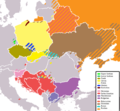The Volapük Wikipedia (Volapük: Vükiped Volapükik) is the Volapük-language edition of the free online encyclopedia Wikipedia. It was created in February...
38 KB (3,651 words) - 08:10, 18 December 2024
speaker community. Three major Volapük conventions were held, in 1884, 1887, and 1889; the last of them used Volapük as its working language. André Cherpillod...
58 KB (6,064 words) - 08:32, 4 January 2025
Pan-Slavic language (redirect from Universalis Lingua Slavica)
other, speakers of different Slavic languages often resort to international lingua francas, primarily English or Russian. But since Slavic languages are closely...
43 KB (5,360 words) - 21:29, 4 November 2024
language, as opposed to an autonomous constructed language like Esperanto or Volapük which were designed for maximal simplicity of lexicon and derivation of...
171 KB (16,379 words) - 03:33, 30 December 2024
Sérgio Meira (category CS1 Volapük-language sources (vo))
knowledge of Volapük material prior to the writing of A Hand-Book of Volapük. In late October 2006, Sérgio Meira started contributing to the Volapük Wikipedia...
11 KB (944 words) - 02:28, 4 July 2024
Interlingua (redirect from Lingua e Vita)
name Interlingua comes from the Latin words inter, meaning 'between', and lingua, meaning 'tongue' or 'language'. These morphemes are the same in Interlingua;...
58 KB (5,856 words) - 15:07, 16 December 2024
July 1, 2012, Everson was appointed to the Volapük Academy by the Cifal, Brian R. Bishop, for his work in Volapük publishing. Everson has been actively involved...
18 KB (1,726 words) - 14:27, 5 November 2024
Etymological Dictionary [32] – Morisyen Etymological Dictionary [33] – Volapük Dictionary [34] – Uralic Etymological Database (Uralonet) [35] – Uralic...
28 KB (2,848 words) - 04:27, 19 October 2024
language movement, supporting various projects throughout his life, including Volapük, Esperanto, Idiom Neutral, and Occidental. Meysmans was born on 14 May...
10 KB (902 words) - 00:11, 8 July 2024
Ugandan Bantu, 1990) Globish (English, 2004) (1868) Universalglot (1879) Volapük (1885) Pasilingua (1887) Esperanto (1888) Mundolinco (1902) Idiom Neutral...
46 KB (5,329 words) - 13:41, 5 January 2025
a classical language like Latin or a new constructed language such as Volapük, Idiom Neutral or Esperanto. Throughout the first part of the 20th century...
82 KB (10,442 words) - 09:47, 18 October 2024
applied practically to any noteworthy extent. The most prosperous were Volapük (1879, Johann Martin Schleyer), Esperanto (1887 Ludwik Lejzer Zamenhof)...
17 KB (1,744 words) - 14:04, 18 November 2024
Interslavic have a long history and predate constructed languages like Volapük and Esperanto by centuries: the oldest description, written by the Croatian...
75 KB (5,944 words) - 05:37, 14 October 2024
flexione Lingua Franca Nova Lingwa de planeta Mondial Neo Nal Bino Novial Pasilingua Sambahsa Solresol Sona Unish Universalglot Uropi Volapük Zonal Afrihili...
4 KB (359 words) - 18:06, 23 October 2024
Universalglot 1868 Jean Pirro An early a posteriori language, predating even Volapük. Volapük vo, vol 1879–1880 Johann Martin Schleyer First to generate international...
30 KB (632 words) - 16:57, 17 December 2024
Hebrew, Latin, English, Spanish, Lithuanian, Italian, French, Aramaic and Volapük, knowing altogether something of 13 different languages, which had an influence...
166 KB (16,706 words) - 15:49, 5 January 2025
linguistic or geographic area, rather than the whole world like Esperanto and Volapük. Although most zonal auxiliary languages are based on European language...
11 KB (1,190 words) - 17:50, 23 October 2024
Vlax Romani – řomani čhib Generally spoken in: Southeastern Europe Volapük – Volapük International language invented by Johann Martin Schleyer Votic –...
113 KB (7,464 words) - 01:06, 18 December 2024
Medefaidrin dmf dmf Neo neu neu neoa1234 Novial nov nov novi1234 Original Volapük vo-rigik Palawa kani pala1356 Quenya qya qya quen1234 Romanova rmv rmv...
11 KB (440 words) - 16:33, 10 November 2024
and Germany. Baumann was a critic of previous international languages; Volapük for its excess verb forms (especially its use of an Aorist aspect), excessive...
39 KB (3,545 words) - 12:01, 21 October 2024
flexione Lingua Franca Nova Lingwa de planeta Mondial Neo Nal Bino Novial Pasilingua Sambahsa Solresol Sona Unish Universalglot Uropi Volapük Zonal Afrihili...
3 KB (159 words) - 20:29, 4 December 2024
List of Wikipedias (redirect from Lingua Franca Nova Wikipedia)
Wikipediyay Zazaki Zaza Latn diq 42,227 33 30 September 2006 Volapük Wikipedia Vükiped Volapükik Volapük Latn vo 39,422 30 27 January 2004 Igbo Wikipedia Wikipedia...
213 KB (931 words) - 03:56, 6 January 2025
Celtic. Brithenig was not developed to be used in the real world, like Volapük, Esperanto, Interlingua or Interslavic, or to provide detail to a work...
36 KB (1,783 words) - 22:03, 17 December 2024
Tshivenḓa vie vie vi Vietnamese Individual Living Tiếng Việt vol vol vo Volapük Individual Constructed vot vot Votic Individual Living vađđa ceeli wak...
86 KB (356 words) - 03:14, 4 December 2024
Organization for Standardization. ALA-LC (1997) "Volapuk" encoding (1990s): Slang term (it is not really Volapük) for a writing method that is not truly a transliteration...
59 KB (4,075 words) - 17:57, 26 December 2024
Machine—history of the transliteration of Slavic languages into Latin alphabets Lingua::Translit Perl module covering a variety of writing systems. Transliteration...
50 KB (3,893 words) - 10:24, 27 October 2024
language barriers, bringing rise to such attempts as Universalglot and Volapük. The latter, as Okrent chronicles, was particularly important to the origin...
25 KB (3,185 words) - 21:21, 16 December 2023
journal}}: Cite journal requires |journal= (help) "Agenzia Regionale per la Lingua Friulana". ARLeF (in Italian). Retrieved 30 September 2023. "Organization...
41 KB (1,027 words) - 13:08, 12 October 2024
flexione Lingua Franca Nova Lingwa de planeta Mondial Neo Nal Bino Novial Pasilingua Sambahsa Solresol Sona Unish Universalglot Uropi Volapük Zonal Afrihili...
7 KB (799 words) - 03:54, 31 December 2024
languages, sometimes called schematic languages, are Esperanto, Ido, and Volapük. Examples of the newer approach, sometimes called naturalistic languages...
21 KB (2,543 words) - 03:16, 2 January 2025














